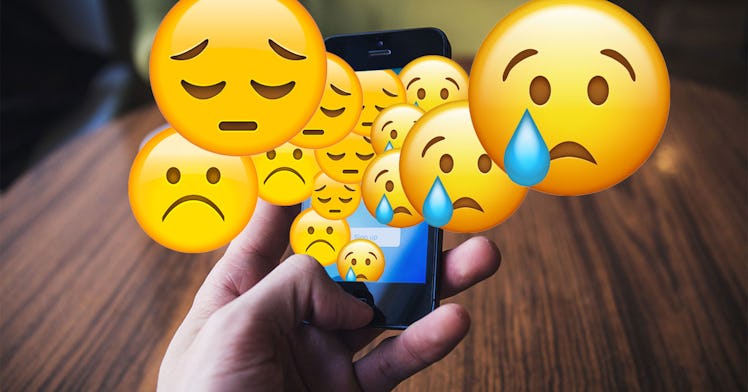Why Social Media Makes Toxic Men More Depressed
The types of online interactions men participate in may help or hurt their depression, and toxic men engage in the worst of it.

Go figure. Men who express sexist, homophobic, competitive, and other toxic male tendencies on social media are more likely to be depressed, according to a new study. The findings underscore the connection between toxic masculinity, negative online behaviors, and depression. This suggests there may hope for these men, even if they don’t want to reduce their social media use or seek help for their depression. They just have to be willing to engage in more positive behaviors online.
“Toxic masculinity focuses on anti-women and anti-feminine attitudes, along with zero-sum thinking,” study coauthor Michael Parent, an assistant professor of psychology at the University of Texas at Austin, told Fatherly. “That kind of mindset was indeed associated with more negative social media use, and higher levels of depression.”
Social media use and depression have been linked in the past, but the research has only looked at the amount of use, rather than what people are actually doing online. Toxic masculinity, a type of hegemonic masculinity associated with rigid gender roles, dominance, and aggression, has increased in prevalence through social media and been similarly associated with mental health problems. Parent and his colleagues hypothesized that toxic masculinity may strengthen the connection between social media use and depression. To investigate this potential link, they asked 402 men to complete questionnaires that assessed three core aspects of toxic masculinity—sexism, homophobia, and competitiveness—and report any symptoms of depression.
As in prior work, they found that social media use was correlated with depression in general. But they also found that men who displayed toxic masculinity (and reported that they considered dominance, misogyny, and homophobia as masculine norms) were more likely to seek out information they disagreed with, pursue negative interactions with others online, and ruminate over these experiences after they stepped away from the computer. These findings indicate that toxic men are more likely to engage in negative social media behaviors, experience symptoms of depression, and externalize this depression with aggression and rage.
As much as negative online behaviors were linked with more depression, positive online behaviors, which included looking at sites that had positive and supportive messages and thinking about those kinds of messages while offline, were associated with lower levels of all types of depression. “We did not initially expect positive and negative social media behaviors to be so strongly and positively related to one another,” Parent says. “It’s much easier to change a pattern of online behaviors that is reinforcing depression, as a starting point, than to try to attack the well-implanted depression, as a first step.”
It’s important to note that the study demonstrates a correlation between toxic masculinity, negative social media behaviors, and depression but it does not prove that one causes the other. And, toxic masculinity aside, the broad conclusion—that people who use social media are less happy overall—stands. “Folks aren’t really divisible, for the most part, into happy, cat-meme-watching social media users and flaming trolls,” Parent says “Rather, the more one uses social media, the more one ends up doing both.”
This article was originally published on